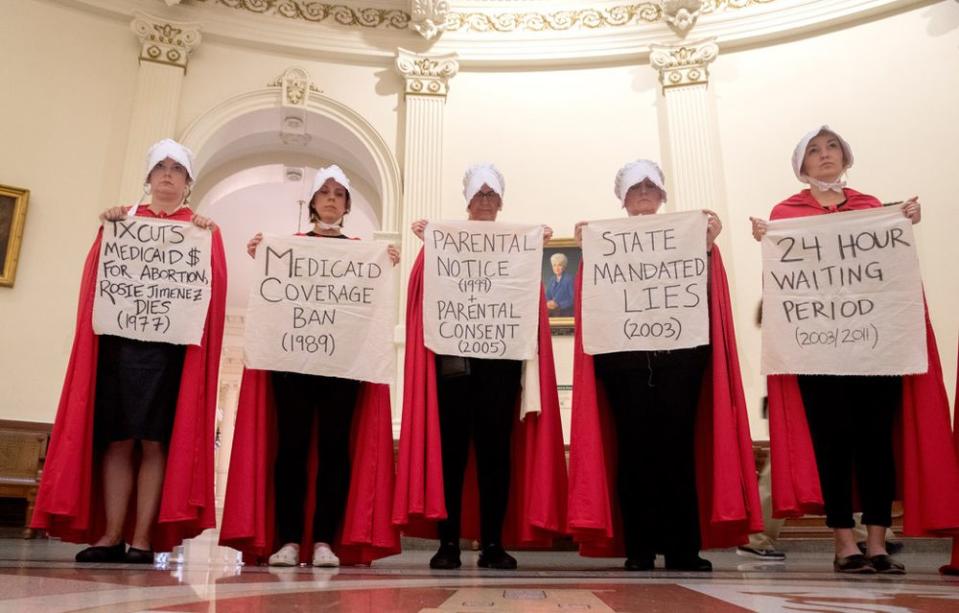Here's What You Should Know About the New Wave of Anti-Abortion Laws
Missouri legislators passed a bill last Friday banning abortions after eight weeks of pregnancy, with no exceptions for rape or incest.
This comes on the heels of Alabama, which passed the most restrictive law in the country just two days before, that essentially bans all abortions — also including those for victims of rape or incest.
And on May 7, Georgia joined three other states that in just the last year banned abortions after six weeks of pregnancy, the time when a doctor can allegedly detect a fetal heartbeat.

While these laws are not yet in effect and are certain to face legal challenges, patients concerned about upcoming medical appointments in Alabama, Georgia, and other states are confused, with calls into Planned Parenthood’s Atlanta call center “skyrocketing,” reports CBS News.
These calls include women, who have been raped, or are victims of incest concerned they can no longer have an abortion.
“It’s been an influx like we’ve never seen before,” Barbara Ann Luttrell, director of communications for Planned Parenthood Southeast, told CBS News.
Why Are So Many Anti-Abortion Measures Happening Now?
The laws’ passage are an effort to spark legal challenges that will reach the “increasingly conservative” Supreme Court in the hopes to “undermine or even overturn” Roe v. Wade, the 1973 decision establishing the right to obtain an abortion, Elizabeth Nash, a legal expert at the Guttmacher Institute, which supports abortion rights, said in a statement to PEOPLE.
Anti-abortion lawmakers and activists have been clear on this goal. “I have prayed my way through this bill,” Republican Alabama state Rep. Terri Collins, who sponsored that state’s abortion ban, told The Washington Post.
“This is the way we get where we want to get eventually.”
The recent tsunami of anti-abortion legislation in Republican-controlled states are a result of decades of work on the part of anti-abortion activists that gained momentum after Donald Trump was elected president and his appointment of two conservative judges.
“This is a coordinated attack on women’s health and rights,” Dr. Leana Wen, President, Planned Parenthood Action Fund, told PEOPLE in a statement. “Doctors and public health leaders agree: the cost will be women’s lives.”
Meanwhile, states with Democratic control, including New York and Vermont, have passed laws to strengthen abortion rights, with about a dozen other states working on similar measures.
How Likely Is it That the Supreme Court Will Overturn Roe V. Wade?
“Alarmingly, the conservative majority on the Supreme Court just this week showed its willingness to overturn longstanding precedent,” Nash, of the Guttmacher Institute, told PEOPLE. “With four abortion cases already on the Supreme Court’s doorstep, and more making their way through lower courts, anyone who still thinks Roe v Wade is not under threat needs to adjust fast.”
Can a Woman Be Punished for Having an Abortion?
On the campaign trail, Trump said “there has to be some form of punishment” for women who have abortions.
Alabama and Missouri’s new laws are clear in forbidding women held criminally liable for having an abortion, a Yale legal expert told The Washington Post.
However, in Georgia, which now defines “unborn child with a detectable human heartbeat” as a living person with rights, that is less clear, University of Georgia law professor Ron Carlson told The Atlanta Journal and Constitution.

District attorneys could seek a murder charge, but it’s not clear if he or she would, or if a murder charge would even stick. “It’s not a black-and-white issue to me, but what complicates matters is that declaration of personhood,” Carlson told the AJC. “If this bill is upheld, there could conceivably be a test case that will have to be decided by the Georgia Supreme Court.”
The Georgia law, also called the “heartbeat bill,” is expected to take effect January 1.
Can a Doctor Be Punished for Providing Abortions?
In Alabama, yes.
Under the new law, doctors could face up to 99 years in prison for performing an abortion. The Georgia law also states that doctors performing abortions will be prosecuted.
What’s Next?
Multiple legal challenges are expected to be filed before these laws go into effect. The American Civil Liberties Union of Georgia has already announced it will be challenging the law there, according to The AJC.
The American Civil Liberties Union and Planned Parenthood have announced plans to file lawsuits against the Alabama law, arguing it’s unconstitutional.
Once lawsuits are filed, the organizations are expected to ask for a preliminary injunction or temporary restraining order to stop the law from taking effect, reports CNN.
“With a record number of extreme bans on abortion and Kavanaugh on the Supreme Court, our fundamental right to health care is under assault like never before,” said Wen, of Planned Parenthood. “We will do whatever it takes to stop this dangerous bill so that patients can continue to access the care they need. We are in for the fight of our lives, for our patients’ lives.”

